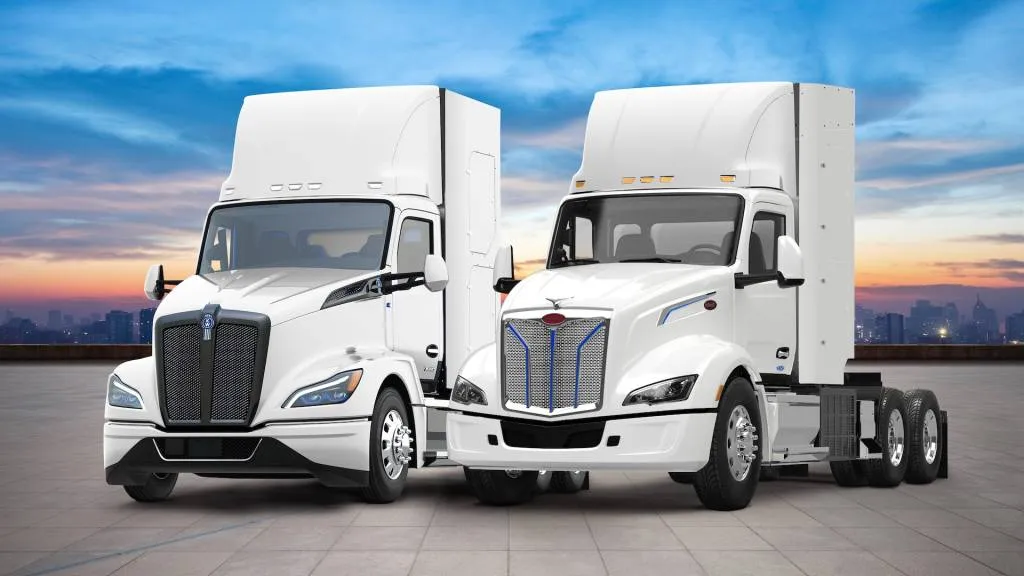Toyota and Hyundai this week announced plans to broaden their respective U.S. hydrogen fuel-cell semi truck projects.
The Japanese automaker has been collaborating with truck maker PACCAR for several years on fuel-cell test vehicles, but on Tuesday it an announced an expansion of the joint effort aimed at pushing fuel-cell trucks toward production.
"The expanded agreement supports ongoing development and commercialized zero-emission versions of the Kenworth T680 and Peterbilt 579 models featuring Toyota’s hydrogen fuel cell powertrain kit," a Toyota press release said, "with initial customer deliveries planned for 2024."
Both the Kenworth and Peterbilt brands are part of the PACCAR truck family.

Kenworth and Peterbilt trucks with Toyota hydrogen fuel-cell modules
The Toyota-PACCAR project builds on years of early efforts involving Kenworth trucks being put to use in California, mainly around ports in Los Angeles and Long Beach to gauge their ability to reduce local emissions and improve air quality. Known as Project Portal, this goes back to 2017.
“We are excited to work with PACCAR to realize a future where Toyota’s industry leading hydrogen fuel cell technology can power heavy-duty trucks that will travel across highways throughout the U.S. with zero emissions,” Christopher Yang, Toyota Motor North America group vice president of business development, said in a statement.
The same day as Toyota's announcement, Hyundai debuted the version of its Xcient Fuel Cell for the U.S. Hyundai in 2021 announced plans to bring this Class 8 truck to California for testing. The Xcient Fuel Cell launched in 2020 and has already operated in Switzerland, Germany, Israel, South Korea, and New Zealand, covering more than 4 million miles so far, according to a Hyundai press release.

Hyundai Xcient Fuel Cell at 2023 ACT Expor
Hyundai brought one of the trucks to the Advanced Clean Transportation (ACT) Expo in Anaheim, California, a 6x4 tractor (with six wheels, four of them powered) with a pair of 90-kw fuel-cell stacks and a 350-kw electric motor. The Xcient isn't just hydrogen-powered; as a battery buffer it packs as much battery capacity as a GMC Hummer EV. Hyundai estimates over 450 miles of range when fully loaded, and a gross combined weight rating (GCWR) of 82,000 pounds.
The release also mentioned an aspiration to "foster partnerships and future businesses to provide fleet operation solutions for hydrogen truck customers," including some efforts related to its planned EV "Metaplant" in Georgia, which is being built to produce up to 300,000 EVs annually, including Hyundai, Kia, and Genesis models. Hyundai was light on specifics, but there will certainly be a lot of trucks moving in and out of a plant that large.
Noticeably absent from this week's announcements, all timed for the Advanced Clean Transportation (ACT) show in Anaheim, California, was General Motors. In 2021 the U.S. automaker announced a joint effort with truck maker Navistar to build and support 2,000 long-haul hydrogen semis, each with a range of more than 500 miles and 15-minute refueling. At the time, Navistar said test vehicles would start a pilot phase by the end of 2022, with production following in 2024.












